 |
Convert WMV to AIFF
|
WMV to AIFF Converter converts WMV files to
AIFF. The converter focuses on AIFF file that supports almost all codecs
in AIFF specification, for example, pcm 8-bit, pcm 16-bit, pcm 24-bit, pcm 32-bit,
pcm 32-bit float, pcm 64-bit float, a-Law, mu-Law, IEEE 754 float, ima4, gsm,
dwvw, and so on. The software also supports common file format such as WMA, AU, M4R (iPhone ringtone), AAC, MPA, AAC for iPod/iPhone/iPad/iTunes/DSi, FLAC, OGG,
etc. It could convert MOD to M4A (MPEG-4 audio), SWF to AU, MP3 to AU, CAF to OGG, ALAC to M4R (iPhone ringtone), MKA to OGG, and so on.
The software is very easy to use and supports batch conversion.
It is full compatible with 32-bit and 64-bit Windows 10/8/7/Vista/XP/2000.

What is WMV?
Windows Media Video (WMV) is a compressed video file format for several proprietary
codecs developed by Microsoft. The original codec, known as WMV, was originally
designed for Internet streaming applications, as a competitor to RealVideo. The
other codecs, such as WMV Screen and WMV Image, cater for specialized content.
Through standardization from the Society of Motion Picture and Television Engineers
(SMPTE), WMV has gained adoption for physical-delivery formats such as HD DVD
and Blu-ray Disc.
A WMV file is in most circumstances encapsulated in the Advanced Systems Format
(ASF) container format. The file extension .WMV typically describes ASF files
that use Windows Media Video codecs. The audio codec used in conjunction with
Windows Media Video is typically some version of Windows Media Audio, or in rarer
cases, the deprecated Sipro ACELP.net audio codec. Microsoft recommends that ASF
files containing non-Windows Media codecs use the generic .ASF file extension.
The ASF container can optionally support digital rights management using a
combination of elliptic curve cryptography key exchange, DES block cipher, a custom
block cipher, RC4 stream cipher and the SHA-1 hashing function.
Although WMV is generally packed into the ASF container format, it can also
be put into the AVI or Matroska container format. The resulting files have the
.AVI and .MKV file extensions, respectively. WMV can be stored in an AVI file
when using the WMV 9 Video Compression Manager (VCM) codec implementation. Another
common way to store WMV in an AVI file is to use the VirtualDub encoder.
Windows Media Video (WMV) is the most recognized video format within the WMV
family. Usage of the term WMV often refers to the Microsoft Windows Media Video
codec only. Its main competitors are MPEG-4 AVC, AVS, RealVideo, DivX, and Xvid.
The first version of the codec, WMV 7, was introduced in 1999, and was built upon
Microsoft's implementation of MPEG-4 Part 2. Continued proprietary development
led to newer versions of the codec, but the bit stream syntax was not frozen until
WMV 9. While all versions of WMV support variable bit rate, average bit rate,
and constant bit rate, WMV 9 introduced several important features including native
support for interlaced video, non-square pixels, and frame interpolation. WMV
9 also introduced a new profile titled Windows Media Video 9 Professional, which
is activated automatically whenever the video resolution exceeds 300,000 pixels
(e.g., 528x576, 640x480 or 768x432 and beyond) and the bitrate 1000 kbit/s. It
is targeted towards high-definition video content, at resolutions such as 720p
and 1080p.
What is AIFF?
Audio Interchange File Format (AIFF) is an audio file format standard used for
storing sound data for personal computers and other electronic audio devices.
The format was co-developed by Apple Computer in 1988 based on Electronic Arts'
Interchange File Format (IFF, widely used on Amiga systems) and is most commonly
used on Apple Macintosh computer systems. AIFF is also used by Silicon Graphics
Incorporated. The audio data in a standard AIFF file is uncompressed big-endian
pulse-code modulation (PCM). There is also a compressed variant of AIFF known
as AIFF-C or AIFC, with various defined compression codecs.
Standard AIFF is a leading format (along with SDII and WAV) used by professional-level
audio and video applications, and unlike the better-known lossy MP3 format, it
is non-compressed (which aids rapid streaming of multiple audio files from disk
to the application), and lossless. Like any non-compressed, lossless format, it
uses much more disk space than MP3¡ªabout 10MB for one minute of stereo
audio at a sample rate of 44.1 kHz and a sample size of 16 bits. In addition to
audio data, AIFF can include loop point data and the musical note of a sample,
for use by hardware samplers and musical applications.
The file extension for the standard AIFF format is .aiff or .aif. For the compressed
variants it is supposed to be .aifc, but .aiff or .aif are accepted as well by
audio applications supporting the format.
- Free Download
WMV to AIFF Converter
- Install the software by instructions
- Launch WMV to AIFF Converter
- Choose WMV Files
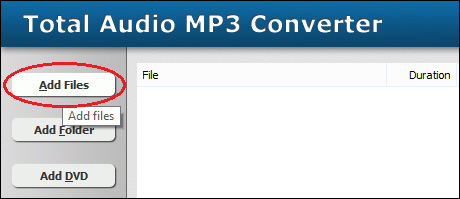
Click "Add Files" to choose WMV files and then add them
to conversion list.
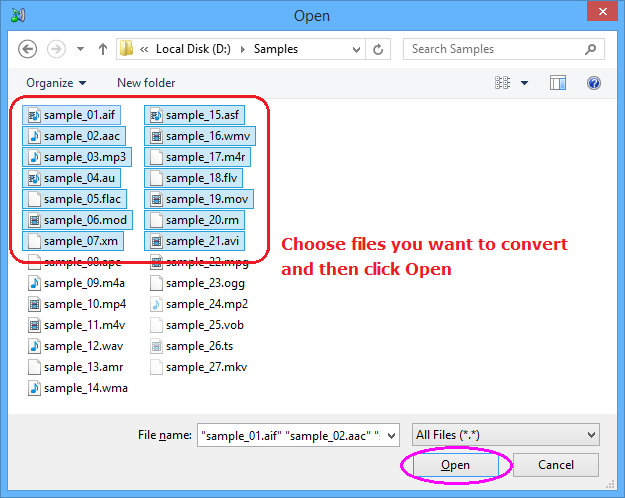
Choose one or more WMV files you want to convert and then click Open.
- Choose "to AIFF"
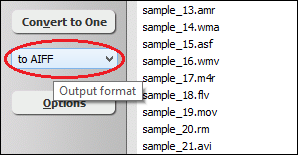
- Convert WMV to AIFF
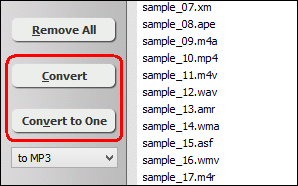
Click on "Convert" to convert WMV files to AIFF format; alternatively,
click on "Convert to One" to convert all files in list and
combine to a single one AIFF file.

The software is converting WMV files to AIFF format.
- Play and Browse AIFF File
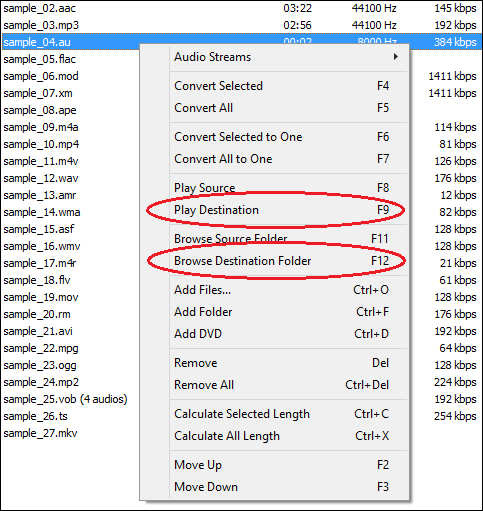
When conversion completes, you could right-click on converted file and choose
"Play Destination" to play the AIFF file; or choose "Browse
Destination Folder" to open Windows Explorer to browse the outputted AIFF
file.
Top
WMV to AIFF Converter is 100% clean and safe to install.
It's certified by major download sites.

WMV to AIFF Related Topics:
|

